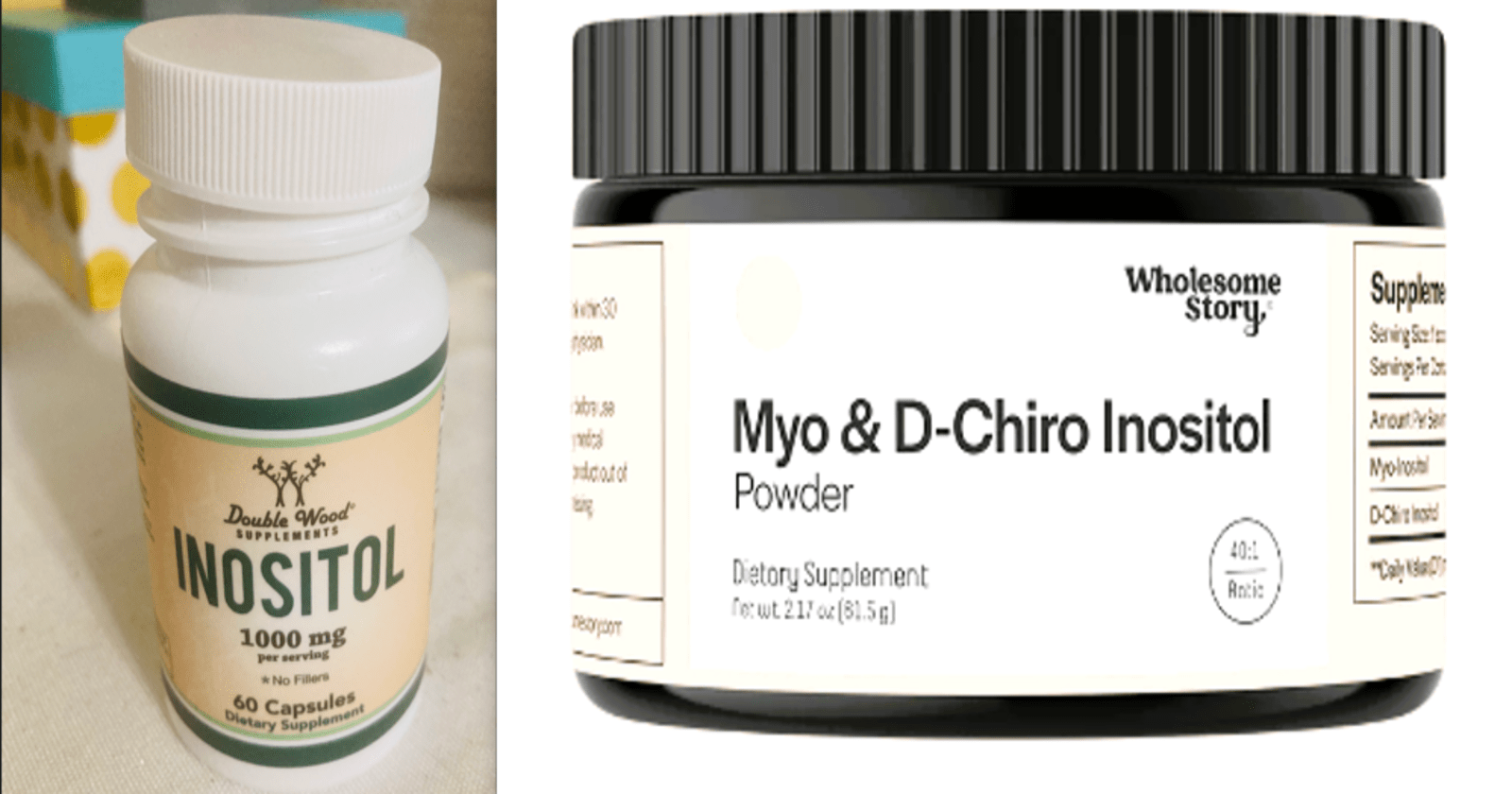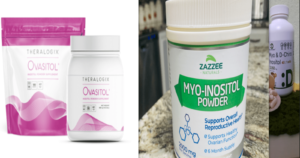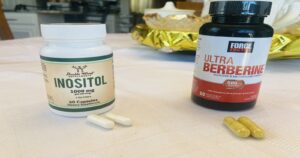Inositol pill, a solid dosage form of a carbohydrate compound that is often classified as B8-vitamin, typically oval in shape and is designed to be swallowed vs Inositol powder finely ground substance that typically consists of tiny particles which allow for a more precise control over dosage.
Healthcare providers can adjust the amount of powder administered to patients more easily than with pre-made tablets or capsules.
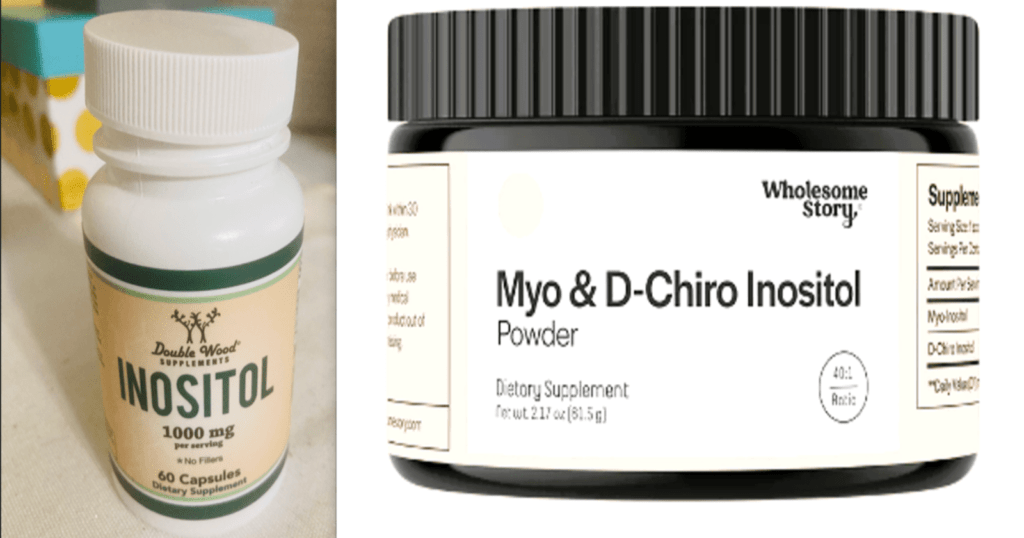
Unveiling inositol and what it really is.
Primarily the isomer myo-inositol, a carbocyclic sugar prevalent in the brain and various mammalian tissues, serves as a pivotal player in cell signal transduction. It responds to a spectrum of hormones, neurotransmitters, and growth factors, while also contributing to osmoregulation. In most mammalian cells, the intracellular myo-inositol concentrations far surpass extracellular levels by 5 to 500 times.
Functioning as a sugar alcohol, myo-inositol exhibits approximately half the sweetness of sucrose (table sugar). Initially deemed a B vitamin, it lost this classification upon the revelation that the human body naturally synthesizes it from glucose.

Notably, the kidneys produce about two grams daily, and various tissues, including the brain, contribute to its synthesis.
In the brain, myo-inositol assumes a crucial role in facilitating the binding of neurotransmitters and certain steroid hormones to their respective receptors.
Inositol is essential for several different cellular processes. It acts as a secondary messenger for your cells and helps with functions such as regulating insulin and binding neurotransmitters.
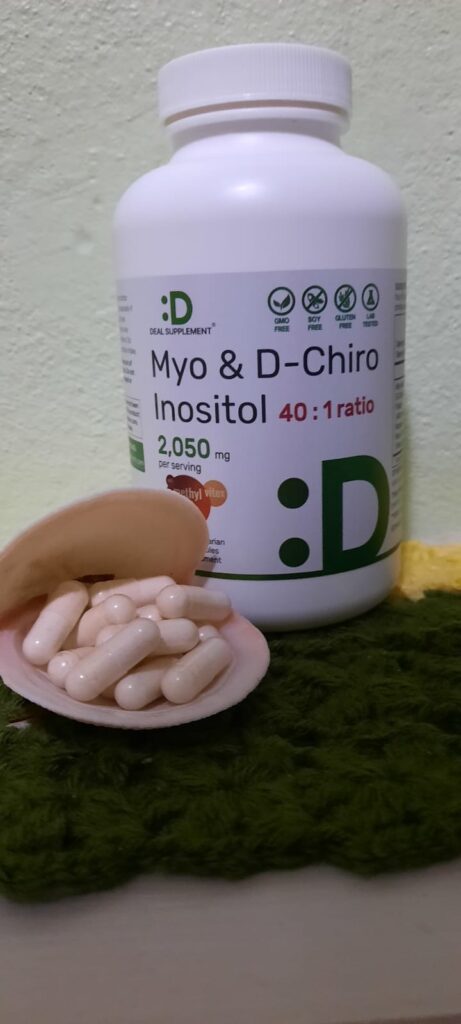

Inositol is involved in the structure of cell membranes and is a component of the signaling molecules in the nervous system. It is often used as a dietary supplement for various purposes, such as supporting mental health, promoting healthy hair growth, and managing certain medical conditions.
Inositol is a naturally occurring compound that plays a crucial role in various cellular functions, particularly in signal transduction and neurotransmitter regulation.
While it is not considered a vitamin, it is often grouped with the B-vitamins due to its similar functions in the body. Inositol deficiency has been linked to various emotional struggles, and understanding the connection between inositol and mental health is essential.
1. Neurotransmitter Regulation:
- Inositol is a precursor to phosphatidylinositol, a key component of cell membranes and a precursor to secondary messengers like inositol triphosphate (IP3). IP3 is involved in signal transduction within cells, including those in the brain.
- Disruptions in these signaling pathways can affect neurotransmitter release, such as serotonin, dopamine, and norepinephrine, which play vital roles in mood regulation.
2. Inositol and Depression:

Lots of young adults suffer depression
- Some studies have suggested a potential link between inositol deficiency and depressive symptoms. Inositol is involved in the serotonin pathway, and alterations in serotonin levels are commonly associated with depression.
- Supplementation with inositol has been explored as a potential adjunctive treatment for depression, with some studies showing promising results.
3. Anxiety and Panic Disorders:
- Inositol has also been investigated for its role in managing anxiety and panic disorders. It is believed to modulate the activity of gamma-aminobutyric acid (GABA), an inhibitory neurotransmitter that helps regulate anxiety.
- Research indicates that inositol supplementation may have anxiolytic effects, potentially reducing symptoms associated with anxiety disorders.
4. Bipolar Disorder and Inositol:
- Bipolar disorder involves dysregulation of mood, and some studies have explored the impact of inositol on bipolar symptoms. The precise mechanisms are not fully understood, but it may involve interactions with neurotransmitter pathways.
5. Insulin Sensitivity:
- Inositol has also been studied for its role in improving insulin sensitivity. Insulin resistance has been linked to various mood disorders, including depression.
- By positively influencing insulin sensitivity, inositol may indirectly contribute to mood stability.
6. Disentangling Despair:
- Despair, often associated with profound sadness and hopelessness, can be influenced by the interplay of neurotransmitters and cellular signaling pathways.
- Inositol’s role in supporting these pathways suggests that its deficiency could contribute to a state of despair by affecting mood-regulating mechanisms.
7. Exploring Emotional Struggles:
- Emotional struggles related to inositol deficiency may manifest in various ways, including persistent low mood, heightened anxiety, and difficulties in emotional regulation.
- Individual responses to inositol deficiency can vary, and factors such as genetics, lifestyle, and overall health may contribute to the complexity of emotional struggles.
Conclusion: Understanding the intricate connections between inositol deficiency and emotional struggles provides valuable insights for potential therapeutic interventions.
While research in this field is ongoing, exploring the role of inositol in neurotransmitter regulation and its impact on mood disorders may offer new avenues for addressing emotional challenges associated with inositol deficiency. Individuals experiencing persistent emotional struggles should consult with healthcare professionals for a comprehensive assessment and appropriate guidance.
10 crucial Use of Inositol
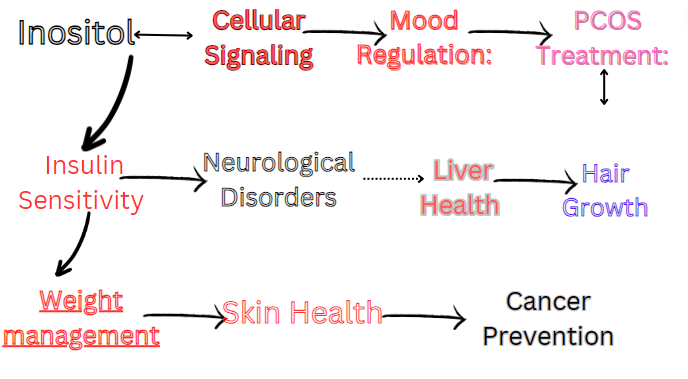
Do you know Inositol have some key important uses, here is a list
1. Cellular Signaling: Inositol is a component of cell membranes and plays a crucial role in cellular signaling pathways.
2. Mood Regulation: It’s linked to mental health and is often used as a supplement for mood disorders, including anxiety and depression.
3. PCOS Treatment: Inositol supplements are sometimes used to help manage symptoms of polycystic ovary syndrome (PCOS).
4. Insulin Sensitivity: Inositol may contribute to improving insulin sensitivity, making it potentially beneficial for individuals with insulin resistance.
5. Neurological Disorders: Research suggests inositol might have a role in treating certain neurological disorders, such as Alzheimer’s disease.
6. Liver Health: It may aid in liver function and is sometimes used in the treatment of fatty liver disease.
7. Hair Growth: Inositol is believed to support healthy hair growth, and it’s often included in hair care products.
8. Weight management: Some studies suggest that inositol supplementation may help with weight loss, particularly in individuals with metabolic disorders.

9. Skin Health: It’s thought to contribute to healthy skin, and topical applications or supplements are sometimes used for conditions like psoriasis.
10. Cancer Prevention: There is ongoing research on the potential role of inositol in cancer prevention, particularly in relation to lung and colon cancers.
7 Secrets of Inositol’s Health Marvels
1. Mood Regulation: Inositol is often associated with mental health. It’s been used as a supplement for conditions like anxiety, depression, and obsessive-compulsive disorder (OCD). It works by influencing neurotransmitters and their receptors in the brain.
3. PCOS Management: For those dealing with polycystic ovary syndrome (PCOS), inositol might be a helpful ally. It has shown promise in improving insulin sensitivity, ovarian function, and hormone levels in women with PCOS.
3. Cellular Signaling: Inositol is a key component of cell membranes and is involved in cellular signaling. It helps cells communicate and respond to various stimuli, contributing to overall cell function.
4. Blood Sugar Control: Inositol may help regulate blood sugar levels by improving insulin sensitivity. This can be particularly beneficial for individuals with insulin resistance or diabetes.
5. Liver Health: It plays a role in lipid metabolism, assisting in the breakdown of fats in the liver. This can contribute to liver health and may be beneficial for conditions related to fatty liver.
6. Support for Nerve Function: Inositol is essential for the proper functioning of nerves. It aids in the formation of myelin, the protective covering of nerves, and helps with nerve signal transmission.
7. Hair Growth: Some studies suggest that inositol may have a positive impact on hair growth, making it a potential supplement for those dealing with hair loss.
Differences in how quickly the body absorbs and utilizes inositol in pill form vs Inositol powder.
Generally, inositol powder tends to have a faster absorption rate compared to pills.
Powdered forms of inositol can be more readily dissolved in fluids during digestion, allowing for quicker absorption through the gastrointestinal tract. This might lead to faster entry into the bloodstream and utilization by the body.
On the other hand, inositol pills need to go through the process of disintegration and dissolution before the inositol can be absorbed. This can take a bit longer compared to the rapid dissolution of inositol powder in liquid.
However, it’s crucial to consider individual preferences and convenience. Some people find pills more convenient to incorporate into their routine, while others prefer the versatility of powders. Ultimately, the choice might depend on personal preferences, ease of use, and specific health goals.
Advantages of Inositol pills vs Inositol powder

Advantages of Inositol Pills:
- Convenience: Pills are easy to carry and consume on the go, making them convenient for those with a busy lifestyle.
- Precise Dosage: Pills offer pre-measured doses, ensuring accurate intake without the need for measuring or weighing.
- Longer Shelf Life: Pills typically have a longer shelf life compared to powders, as they are less susceptible to moisture and environmental factors.
Advantages of Inositol Powder:
- Customizable Dosage: Powder allows for more flexibility in adjusting the dosage to meet individual needs, which can be beneficial for those requiring specific amounts.
- Absorption: Some argue that the powder form may be absorbed more quickly by the body, potentially leading to faster therapeutic effects.
- Cost-Effective: In general, powders are often more cost-effective than pills, providing more servings per container at a lower overall cost.
- Dosage: Inositol powder allows for much more flexibility, when it comes to dosage.
Role inositol plays in Polycystic ovary syndrome(PCOS )Treatment.
Polycystic ovary syndrome(PCOS ) is the most common cause of anovulatory infertility in industrialized nations, and it is associated with insulin resistance, type 2 diabetes mellitus, and increased cardiovascular risk.
Inositol, particularly myo-inositol and D-chiro-inositol, has gained attention in the treatment of Polycystic Ovary Syndrome (PCOS). These compounds are considered to be part of the B-vitamin family and are involved in various cellular processes.
Research suggests that inositol supplements may help improve insulin sensitivity, ovarian function, and hormonal balance in women with PCOS. Insulin resistance is a common factor in PCOS, and inositol may help address this by influencing insulin signaling pathways.
Myo-inositol, in particular, is thought to have a positive impact on ovarian function, menstrual regularity, and egg quality. D-chiro-inositol is also involved in insulin metabolism and has been studied for its potential benefits in PCOS.
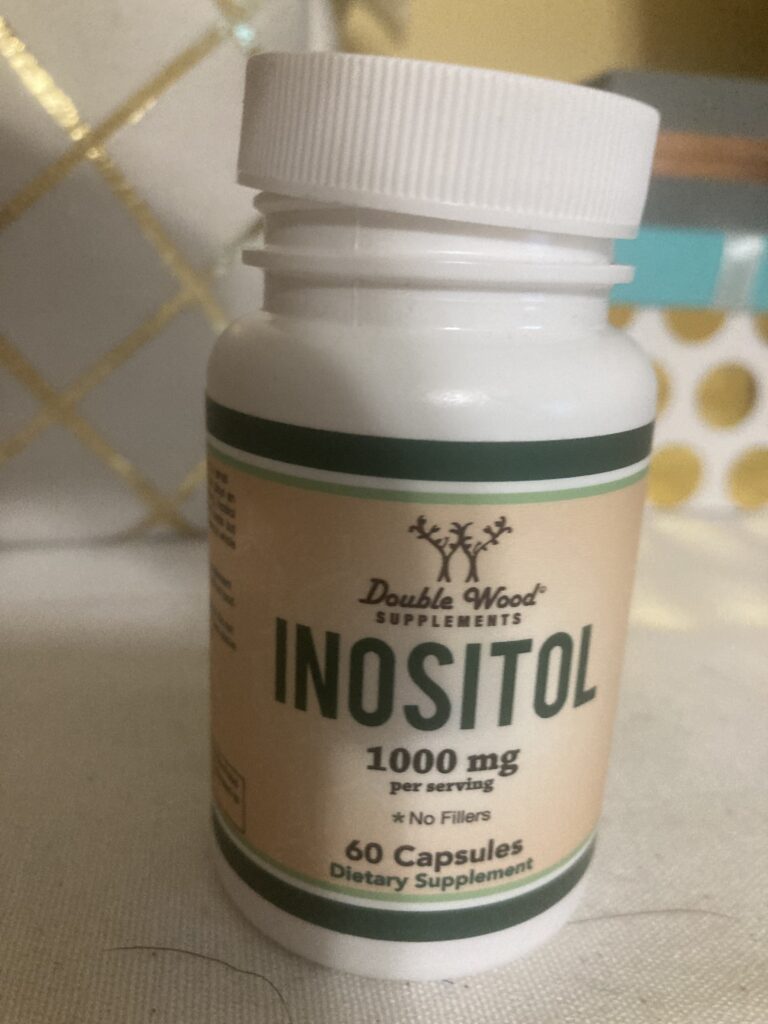
In the ovaries, almost all of the inositol is Myo-Inositol, with a small amount being D-chiro-Ins. An imbalance, like having too little Myo-Inositol, can mess with FSH signaling in PCOS patients.
D-chiro-Ins is made from Myo-Inositol with the help of insulin. When there’s too much of this process in the theca cells, it leads to a shortage of Myo-Ins, which seems to play a big role in causing PCOS.
This shortage can mess with glucose uptake and the way oocytes and follicular cells use glucose, potentially harming the quality of eggs thus leading to infertility, this is where Inositol plays a key role in helping to reverse this damage.
Disadvantages of Inositol pills vs Inositol powder
| Inositol Pills | Inositol Powder |
|---|---|
| Easy to take with water or as directed | Requires mixing with liquid or food |
| Fixed dosage per pill | Adjustable dosage for individual needs |
| May take longer to dissolve and absorb | Can be quickly absorbed into the system |
| May have a coating for easy swallowing | May have a slightly sweet taste |
| May be more expensive per dose | Often more cost-effective per serving |
| Convenient for on-the-go consumption | Bulkier and may require measuring |
5 top common diseases link to inositol deficiency
1. Polycystic Ovary Syndrome (PCOS): Inositol supplementation, particularly myo-inositol, is explored for its potential benefits in managing PCOS symptoms.
2. Depression and Anxiety: Some studies suggest a connection between low inositol levels and mental health disorders. Inositol is involved in neurotransmitter function, and supplementation has been considered in the treatment of depression and anxiety.
3. Insulin Resistance and Type 2 Diabetes: Inositol, particularly D-chiro-inositol, plays a role in insulin signaling, and deficiency may contribute to insulin resistance seen in conditions like type 2 diabetes.
4. Disorders: Inositol is crucial for the central nervous system. While not a direct cause, low inositol levels have been associated with certain neurological disorders.
5. Eating Disorders: Individuals with eating disorders may have lower inositol levels, and supplementation has been explored in the context of these conditions.
6. Acne: myo inositol which tremendously helped acne.
7. Bloating: Reduction in abdominal bloating.
Understanding the digestibility of Inositol in pill vs powder forms.
Inositol Pills:
- Advantages:
- Often coated for easier swallowing, reducing the likelihood of stomach upset.
- Convenient for those who prefer a quick and simple method of consumption.
- Disadvantages:
- May take longer to dissolve and break down in the digestive system.
- The coating may sometimes affect how quickly the inositol is released and absorbed.
Inositol Powder:
- Advantages:
- Can be quickly dissolved in liquids or mixed with food, potentially leading to faster absorption.
- The powder form allows for more flexibility in adjusting dosage based on individual needs.
- Disadvantages:
- Some individuals may find the taste or texture less palatable.
- Requires careful measuring to ensure accurate dosage, which may be less convenient on the go.
Gentleness on the Stomach:
- Both pill and powder forms of inositol are generally well-tolerated by most individuals.
- Some people may experience mild gastrointestinal discomfort, such as bloating or gas, especially when starting inositol supplementation. This is usually temporary and tends to improve over time as the body adjusts.
Personal Considerations:
- Individuals with specific digestive sensitivities or preferences may find one form more suitable than the other.
- Taking inositol with meals can sometimes help mitigate potential stomach discomfort.
Unlock 7 Secrets of Inositol’s Health Marvels”
Whether you go for inositol pills or powder, the key is to stay consistent.
With pills, it’s easier to get a precise dosage, but powder allows for more flexibility in adjusting amounts. Just be sure to measure accurately.
Also, keep an eye on the form—myo-inositol and D-chiro-inositol are common types, and they might have different effects.
It’s always a good idea to consult with a healthcare professional before making significant changes.
General Tips:
- Consult a Professional: Before making any changes, it’s essential to consult with a healthcare professional to determine the right form and dosage for you.
- Consistency is Key: Whether you choose pills or powder, consistency is crucial for seeing the potential benefits.
- Monitor Effects: Pay attention to how your body responds and make adjustments as needed under professional guidance.
- Quality Matters: Ensure you’re getting a high-quality product from a reputable source to guarantee purity and effectiveness.
How Inositol Powder Unleashes Personalized Wellness: Mastering Dosage Precision for Optimal Health!
Inositol powder offers a fantastic advantage when it comes to dosage precision. Unlike standardized doses in pill form, where you’re limited to pre-set amounts, inositol powder allows for much more flexibility.
Measuring with precision becomes a breeze with the powder. You can easily tailor your dosage to meet your specific needs, whether you’re adjusting based on your body’s response or fine-tuning for a personalized wellness plan.
This level of control is especially beneficial for those who may require higher or lower doses than what’s readily available in pill form.
Additionally, the powder form makes it simple to mix into beverages or food, further enhancing the customization.
It’s like having a chef’s control over your inositol intake, crafting the perfect blend for your individual requirements. So, if you’re all about personalized and precise dosing, inositol powder is definitely the way to go!
Cost effectiveness of Inositol Pills vs Inositol Powder
In the cost showdown between inositol pills and powder, the powder takes center stage for being more budget-friendly.
When you break down the cost per serving, you’ll often find that inositol powder offers a more economical option. Why? Well, it’s not just about the product itself, but also the reduced packaging and processing associated with powders.
Moreover, with pills, you might be paying extra for the convenience of pre-measured doses.
However, if you’re all about precision and don’t mind a bit of more, inositol powder allows you to control your intake without breaking the bank. It’s not just a win for your health but also for your wallet.
So, when it comes to the cost-effectiveness battle, inositol powder emerges as the thrifty champion for savvy wellness enthusiasts.
What is the best way to take inositol powder for weight loss?
To harness the potential weight-loss benefits of inositol powder, consider dissolving it in a liquid of your choice and incorporating it into your daily routine.
The suggested daily intake typically ranges between 500mg to 2g, spread across 2 to 3 doses throughout the day.
However, it’s crucial to consult with a healthcare provider before diving into any supplementation to ensure safety and suitability for your individual health profile.
While inositol may offer support in your weight-loss journey, it’s not a guaranteed solution on its own. For holistic well-being and effective weight management, complement your supplement routine with a balanced and nutritious diet.
Don’t forget to embrace regular physical activity, as these lifestyle factors play a vital role in achieving and maintaining a healthy weight. Always consider the bigger picture for comprehensive health and fitness goals.
Environmental impact of Inositol
Inositol powder tends to be more environmentally friendly compared to its pill counterparts. The production of powders often involves fewer processing steps and less packaging, reducing overall environmental impact.
Additionally, lighter weight and compact packaging lead to lower transportation emissions. With inositol powder, it’s a small yet impactful step towards a greener, healthier planet.
Resources
https://pubchem.ncbi.nlm.nih.gov/compound/Inositol
https://pubmed.ncbi.nlm.nih.gov/33153126/
https://www.webmd.com/vitamins/ai/ingredientmono-299/inositol
